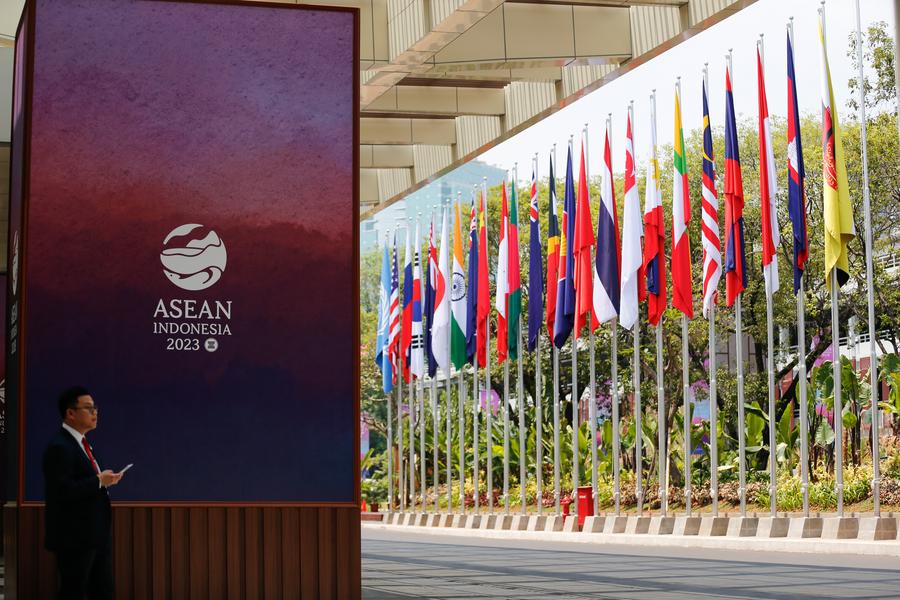
 Print
Print
Commentary: More countries are rejecting U.S. calls to take sides, why?
2024/03/11 19:24
Origin:Xinhua



A man is pictured at the venue of the 43rd Association of Southeast Asian Nations (ASEAN) Summit in Jakarta, Indonesia on Sept. 5, 2023. (Xinhua/Wang Yiliang)
More Southeast Asian countries are prioritizing their independence and development, saying "no" to Washington and refusing to kowtow to Western interests.
HONG KONG, March 7 (Xinhua) -- Malaysian Prime Minister Anwar Ibrahim has recently rejected pressure by the United States and its allies on regional nations to take sides in the West's rivalry with China.
Attending a summit of Australia and the Association of Southeast Asian Nations (ASEAN) held in the Australian city of Melbourne, Anwar emphasized that the West should not preclude Malaysia from being friendly to China, criticizing the West for suffering from "China-phobia."
For Malaysia, a sound relationship with China is in its interests. Described as a "fiercely independent" country by its leader, Malaysia has no reason to compromise its own interests to satisfy the United States' hegemonic appetite. That is why Anwar has rejected U.S. calls to take sides against China.
The Southeast Asian country was among the first countries to embrace the Belt and Road Initiative. Projects like the Malaysia-China Kuantan Industrial Park and Xiamen University Malaysia have benefited the peoples of both countries.
Since 2009, China has remained Malaysia's largest trading partner for 15 consecutive years, while Malaysia is China's second-largest trading partner within the ASEAN framework. In the future, further cooperation with China will undoubtedly provide Malaysia with more opportunities for development transformation.
Globally, Malaysia's stance resonates with a growing sentiment among many developing countries, which are becoming aware of Washington's intention to contain China's development by selling "security anxiety" and promoting camp confrontation.
During the 43rd ASEAN Summit in September last year, Indonesian President Joko Widodo urged the regional group to stay united and not be a proxy to any power.

Policemen stand guard near the venue of the 20th Shangri-La Dialogue at Singapore's Shangri-La Hotel on June 2, 2023. (Photo by Then Chih Wey/Xinhua)
Similarly, at Shangri-La Dialogue 2023, leaders of countries including Indonesia and Singapore said they do not want to see a "new Cold War" or be forced to choose sides between China and the United States.
These voices once again manifest the mainstream consensus of the international community -- China is an opportunity and a partner, not a threat or rival. An analysis by the International Monetary Fund showed that when China's growth rate rises by 1 percentage point, growth in other countries increases by around 0.3 percentage point.
Meanwhile, since the Regional Comprehensive Economic Partnership came into effect, China, as a significant participant and active promoter of the agreement, has injected confidence into free trade, multilateralism, and regional economic integration.
Moreover, for developing countries, China has set an example of pursuing a path to modernization suitable for its national conditions, breaking the myth that modernization means Westernization.
Additionally, the three major global initiatives proposed by China focus on global development, security and the coexistence of civilizations, gaining widespread recognition across the globe.
In contrast, the United States, to maintain its global hegemony, clings to a Cold War mentality, constantly creating imaginary enemies and provoking bloc confrontation, which runs counter to the global trend of peace and development.
In Southeast Asia, the United States seeks to weaken the ASEAN-centered regional cooperation architecture and attempts to create a hegemonic system under its control.
The sharp contrast can well explain why more countries, prioritizing their independence and development, are saying "no" to Washington and refusing to kowtow to Western interests.
Just as the Malaysian prime minister has told U.S. Vice President Kamala Harris, "I want to focus on what is best for us."
| Xinhua | China Plus
Copyright ? CCEDN.COM.CN. All Rights [京ICP備2024049485號(hào)-1] Tel: 0086-10-88820521

